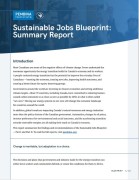Dear Minister Boissonnault,
On behalf of the Pembina Institute, I would like to thank you for the opportunity to participate in Employment and Social Development Canada’s engagement (the engagement) on fostering a modern, inclusive, and productive labour market for the 21st century. We have provided our responses to the online questionnaire and offer here a summary of our suggested priorities.
Workers are navigating the uncertainty and hardships caused by inflation, housing market constraints, and structural shifts in keystone industries stemming from changes in technology and world markets. At the same time, the global energy transition is accelerating with trillions of dollars of new investment. This creates further uncertainty for some workers even as it creates
new opportunities. Canada must compete on growth and productivity while grappling with a constrained labour market that makes achieving emission reductions more difficult.
The Pembina Institutes supports the three priority areas identified in the engagement, and recommends a fourth: developing an industrial strategy for Canada. Such a strategy should include a jobs plan to capitalize on the workforce, economic, and environmental benefits that come with the shift to a low-carbon economy. A jobs plan for Canada could provide the needed direction to key actors including labour, employers, and education training institutions, enabling them to align around a shared strategy to tackle the many intersecting societal challenges we presently face. Such a plan would demonstrate how leveraging economic priorities and supporting the empowerment of skilled labour would put more Canadians in a position to take up decent jobs, build wealth, and create opportunities for industries to thrive – particularly those industries needed to achieve a net-zero economy.
For this jobs plan to succeed, Canada must undertake a comprehensive labour market analysis and model future economic scenarios to identify the impact of demographic shifts, automation, and the global energy transition. All essential to enable labour, employers, and training institutions to plan for the future.
While provinces and territories hold a significant share of the constitutional division of power with regards to the labour market, the Government of Canada set forth a national vision and strategy for the workforce and work with the provincial and territorial governments to reallocate or replenish the $625 million in funding cut from the Labour Market Transfer Agreements. Each
regional labour market has distinct characteristics, therefore a regional approach to labour market development is critical.
The Pembina Institute is pleased to see the rollout of new funding that supports environmental and workforce objectives through the Sustainable Jobs Training Fund and Union Innovation Training Program – Sustainable Jobs Stream. The projects funded under these initiatives are crucial to strengthening the institutional capacity needed to ensure workers can access new opportunities and to provide industry with access to the skilled talent for powering a clean energy economy. We encourage Canada to continue to invest in and implement policies and programs that support education and training institutions and employers with resources to train workers, provide financial supports for workers seeking assistance — particularly for equity-deserving individuals — and to support youth and workers at all stages of their careers in navigating career prospects.
We encourage you to engage with labour, civil society and environmental groups, including the Net-Zero Advisory Body and Sustainable Jobs Partnership Council as Canada moves toward building a workforce for a low-carbon economy.
We look forward to continuing to work with the Government of Canada to build upon the
important work and successes that continue to be achieved for workers.
Yours sincerely,
Chris Severson-Baker
Executive Director
Pembina Institute






